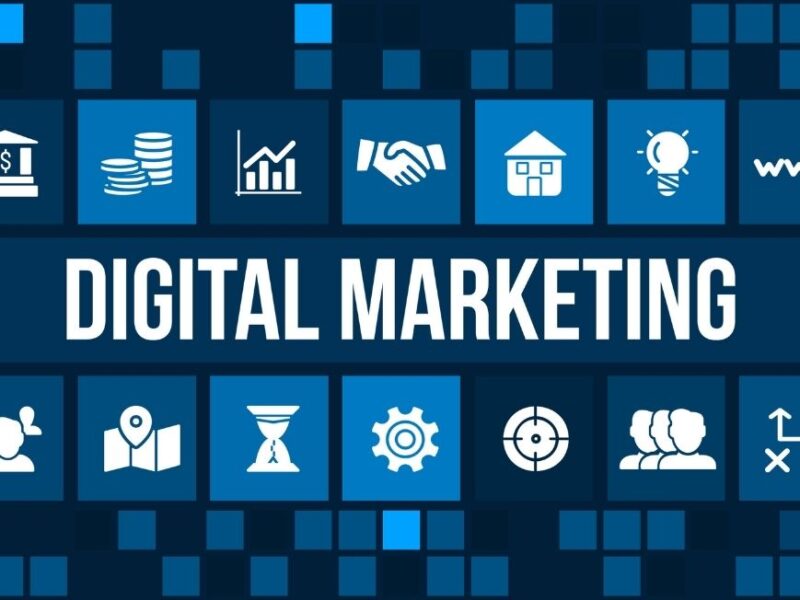On this page you will read detailed information about Digital Marketing.
In the rapidly evolving landscape of the business world, understanding digital marketing is no longer optional—it’s imperative. As a modern professional, you must navigate the complexities of online engagement, harnessing strategies that propel your business forward in a digital-first economy. Digital marketing encompasses a broad spectrum of tactics, from search engine optimization to social media outreach, each designed to connect with a tech-savvy audience. This article will guide you through the essential strategies that define successful digital marketing, equipping you with the knowledge to enhance your brand’s visibility and impact in the virtual marketplace.
Understanding Digital Marketing: A Comprehensive Overview
Defining Digital Marketing
Digital marketing encompasses all efforts that utilize the internet and electronic devices to engage with current and prospective customers. It is a pivotal tool for businesses aiming to enhance their online presence, engage in real-time interactions, and drive high-quality traffic to their websites. This form of marketing distinguishes itself from traditional methods by its capacity for targeted audience reach, cost-effectiveness, and ability to provide measurable results, effectively bridging the gap between brands and their audiences through online channels.
Key Components of Digital Marketing
Understanding the core components of digital marketing is essential for any modern business. These components include:
- Search Engine Optimization (SEO): This involves optimizing a website to increase its visibility in search engine results. SEO is crucial for driving organic traffic, which leads to higher lead generation and conversion rates by boosting online visibility.
- Content Marketing: This strategy focuses on creating valuable, relevant, and engaging content. Through content marketing, businesses can build trust with their audience, and establish authority in their respective fields.
- Social Media Marketing: Utilizing platforms like Instagram, Facebook, and TikTok, brands can foster community and enhance customer loyalty. Social media allows for real-time interactions and storytelling, transforming how brands engage with their audiences for increased engagement.
- Email Marketing: This method uses personalized campaigns to nurture leads, build customer relationships, and drive conversions. Email marketing remains a powerful tool for customer retention when executed with a focus on delivering valuable content and promotions.
The Importance of a Well-Crafted Strategy
A successful digital marketing strategy requires a detailed understanding of your target audience and clear marketing objectives. By regularly auditing your marketing assets and aligning strategies with customer needs, businesses can enhance their online reach and efficiency. Implementation of data analytics allows for optimizing marketing efforts and improving campaign effectiveness through insights into consumer behavior.
Key Components of Effective Digital Marketing Strategies
Search Engine Optimization (SEO)
Search engine optimization (SEO) serves as the backbone of any productive digital marketing strategy. Its core function is to enhance a website’s visibility across search engine results, driving more qualified leads to a business. By leveraging targeted keywords, businesses can amplify their presence in search results, thereby boosting brand awareness and generating quality leads. Emphasizing SEO doesn’t just improve rankings; it positions your brand as an industry leader.
Content and Social Media Marketing
Creating and sharing compelling content is vital for captivating potential customers. Content marketing involves crafting high-quality, informative content to engage your audience. Coupled with social media marketing, this approach bolsters brand visibility and engages diverse consumer groups across platforms. It’s essential for businesses to select the right channels, optimize posting times, and adapt strategies based on performance insights.
Web Design and User Experience
A responsive website with engaging content not only draws potential customers but also keeps them exploring. Providing a seamless user experience, especially on mobile devices, is crucial in today’s digital landscape. A thoughtfully designed site supports navigation, retains visitors, and drives conversions.
Email Marketing and Analytics
Email marketing remains a cost-efficient tactic for nurturing leads and driving conversions. It allows businesses to stay top-of-mind with personalized promotions and company news. Monitoring and analyzing key performance metrics through marketing analytics enable continuous optimization of campaigns, improving ROI. Implementing data-driven strategies fosters informed decision-making and maximizes impact.
Leveraging Social Media for Digital Marketing Success
Understanding the Impact of Social Media
In the realm of digital marketing, social media emerges as a powerful catalyst. It offers unprecedented opportunities for businesses to cultivate brand visibility, enhance engagement, and drive conversions. Platforms like Facebook, Instagram, and Twitter serve as dynamic spaces where brands can form connections, share compelling narratives, and listen to customer feedback. With billions of active users globally, social media channels become potent tools for marketing that can amplify brand presence and foster meaningful customer relationships. Each platform bears unique strengths that can be harnessed to align with distinct business goals.
Strategies for Effective Social Media Use
To effectively wield the power of social media, businesses must tailor strategies to the specific features and audiences of each platform. Instagram stands out for its visually driven engagement, making it ideal for brands focused on lifestyle and aesthetics, as seen with campaigns by Nike and National Geographic. Meanwhile, LinkedIn is perfect for B2B marketing efforts, providing a professional environment for thought leadership and industry-specific content sharing. Engaging video content on YouTube continues to captivate audiences, offering a chance to educate and entertain simultaneously. For real-time interactions and trendjacking, Twitter proves invaluable, while TikTok thrives with its short-form video format appealing to younger demographics.
Engaging Your Audience
Audience engagement is the heartbeat of social media marketing. Promoting dialogue through comments, messages, and shares enhances customer satisfaction and brand loyalty. Employing tools for content scheduling, analytics, and community management can boost your efforts, helping to craft resonant messages that captivate and convert. Brands like Dunkin’ and Dove have excelled by leveraging user-generated content and influencer partnerships, creating authentic connections that drive trust and loyalty. As a business, your focus should be on understanding your audience’s desires and creating tailored, insightful content—because in the world of social media, connection is key.
The Role of SEO in Digital Marketing
Understanding SEO Fundamentals
Search Engine Optimization (SEO) is a critical component of any digital marketing strategy, serving as the bridge between websites and their visibility on search engines. SEO involves enhancing a website’s architecture, content, and interactions to make it more accessible and relevant to search engine algorithms. It includes various elements such as keyword optimization, meta tags, and mobile-friendliness, all aimed at improving search rankings and driving organic traffic. The significant advantage of SEO lies in its ability to offer a sustainable traffic source by aligning a business’s web presence with user search intentions as detailed by Moz.
On-Page and Off-Page Optimization
Both on-page and off-page optimization play integral roles in the success of an SEO strategy. On-page optimization refers to techniques applied directly on the website to enhance its visibility, including improving meta descriptors and quality of content. Conversely, off-page SEO focuses on building external signals such as backlinks to increase website authority and reliability. Implementing a robust combination of both strategies can greatly enhance a website’s standing in search engine results pages, thus boosting its visibility and attracting more users.
The Benefits of Technical and Local SEO
Enhancing the technical aspects of SEO ensures that search engines can effectively crawl and index a site, which is essential for its discoverability. This involves optimizing site speed, designing a mobile-friendly interface, and ensuring that the website’s back-end structure supports SEO best practices. Additionally, local SEO has gained prominence as it aids businesses in appearing in geographically relevant searches, which is especially beneficial for small businesses targeting local clientele. Utilizing these strategies not only improves online presence but also increases engagement and fosters trust, leading to higher conversion rates as discussed by Metric Marketing.
In the previous post, we had shared information about Understanding Key Digital Marketing Metrics: CTA, CTR, CPC, CPM, so read that post also.
Future Trends in Digital Marketing: What to Expect
Embracing AI and Machine Learning
Artificial Intelligence (AI) and Machine Learning (ML) are poised to revolutionize digital marketing on a grand scale. They’re set to optimize crucial tasks such as customer segmentation, creating dynamic content, and facilitating personalized interactions. This isn’t just about automating repetitive tasks; rather, it’s about leveraging AI to create rich, engaging customer experiences. Marketers must polish their understanding of AI, balancing the potential for enhanced e-commerce with the risk of AI fatigue. Learning to integrate AI agents effectively will be a key skill for future readiness in the digital marketing landscape as highlighted in industry discussions.
The Rise of Voice and Augmented Technologies
The growing dominance of voice search and voice commerce is reshaping how brands approach search engine optimization. Emphasizing long-tail keywords and natural language processing will be essential to capture an audience increasingly reliant on voice-activated technologies. At the same time, Augmented Reality (AR) and Virtual Reality (VR) are transforming retail and customer engagement. These tools offer immersive experiences that meet rising consumer expectations for interactivity and personalization. As more consumers seek augmented content, brands investing in these technologies will likely see significant competitive advantages, a trend well-documented by experts.
Personalization and Social Commerce Integration
Personalization continues to be a decisive factor in consumer brand loyalty. By using dynamic content platforms and AI-driven solutions, businesses can deliver hyper-personalized experiences at scale. Additionally, the convergence of social media and e-commerce is leading to the emergence of social commerce. This trend blurs boundaries, allowing consumers to purchase directly within their social feeds. Recognizing the importance of creating seamless online shopping experiences can harness these platforms’ full potential, driving growth while maintaining customer engagement and trust as seen in recent analyses. The emphasis on understanding consumer behavior shifts, coupled with a focus on privacy-friendly strategies, will be pivotal in cultivating long-term brand loyalty.
Conclusion
In navigating the intricate landscape of digital marketing, you have the opportunity to leverage transformative strategies that propel your business into the forefront of the modern marketplace. By embracing tools such as social media, content marketing, and analytics, you can forge meaningful connections with your audience and drive measurable growth. As you continue to evolve and adapt, remember that the digital realm offers an ever-expanding realm of possibilities. Your commitment to innovation and strategic engagement will not only enhance your business’s visibility but also ensure its sustained success in an increasingly competitive digital world.
Disclaimer
The content published on the Marketyra blog is for educational and informational purposes only. While we strive to share accurate and up-to-date digital marketing tips, strategies, and trends, we do not guarantee any specific results. Readers are advised to use their own judgment before applying any tips or advice provided. Marketyra is not liable for any losses, damages, or issues arising from the use of blog content.
So friends, today we talked about Digital Marketing, hope you liked our post.
If you liked the information about Digital Marketing, then definitely share this article with your friends.
👉 Need help with SEO or digital marketing services?
Feel free to call us at 📞 +91-9306925861, email us at 📧 admin@marketyra.com to get in touch!







